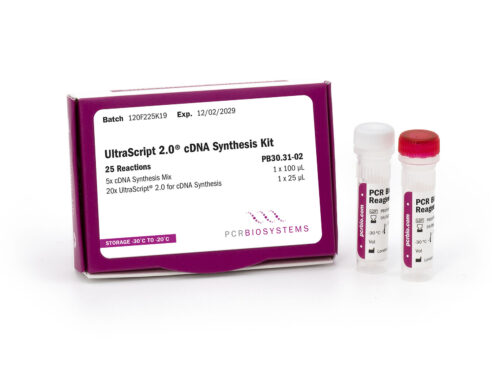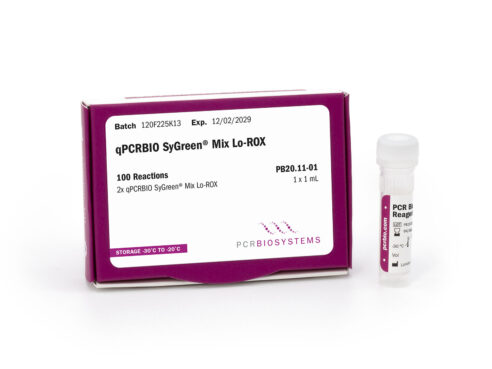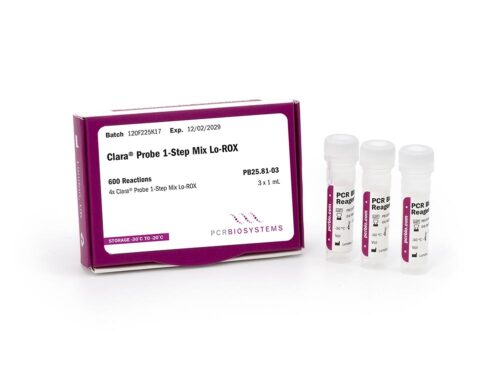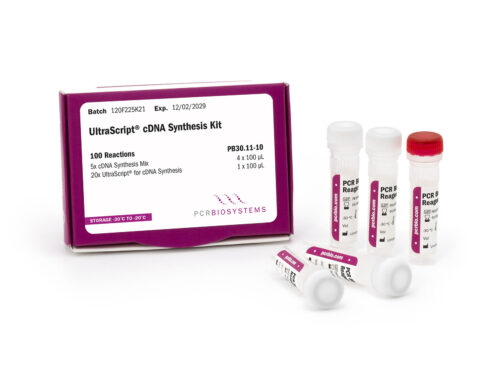RiboShield® RNase Inhibitor
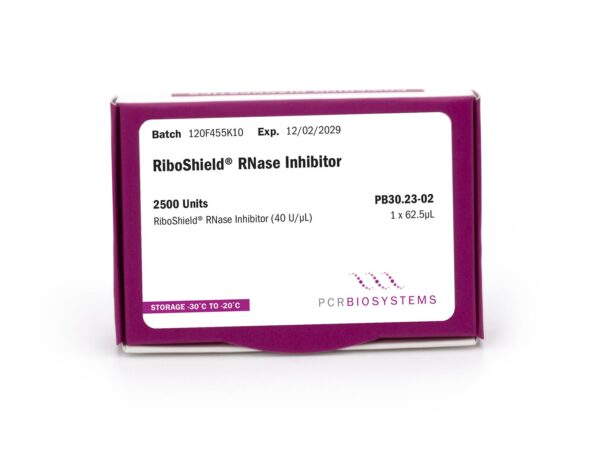
RiboShield® RNase Inhibitor is a recombinant protein that blocks the activity of a wide range of ribonucleases to reliably protect your samples from RNase digestion.
This RNase inhibitor is designed for use in RNA-sensitive applications such as RT-qPCR, cDNA synthesis and RNA sequencing, where the presence of even small amounts of RNase can be highly detrimental to RNA quality and experimental outcome.
Ribonucleases (RNases) are found in all cell types and organisms, and their ubiquitous nature can be highly problematic in the lab. Contamination with even the smallest amount of RNase in an RNA sample is enough to completely destroy the RNA. RiboShield® RNase Inhibitor is a recombinant human placental protein that blocks the activity of a wide range of ribonucleases, including RNase A, B and C, to reliably protect your RNA from RNase digestion.
Features
- Superior protection leading to better performance of RNA-sensitive applications
- Particularly suited to incorporation into saliva-based tests for SARS-CoV-2 detection
- Compatible with reverse transcriptases, RNA polymerases and Taq DNA polymerase
- Protects RNA samples during storage
- Inhibits eukaryotic RNases, including RNase A, B and C
- Stable up to 65°C for at least 30 minutes
- Ribonuclease and phosphatase free
Applications
- cDNA synthesis
- 1-step RT-PCR
- 1-step RT-qPCR
- RNA purification
- RNA sequencing
- In vitro transcription and translation
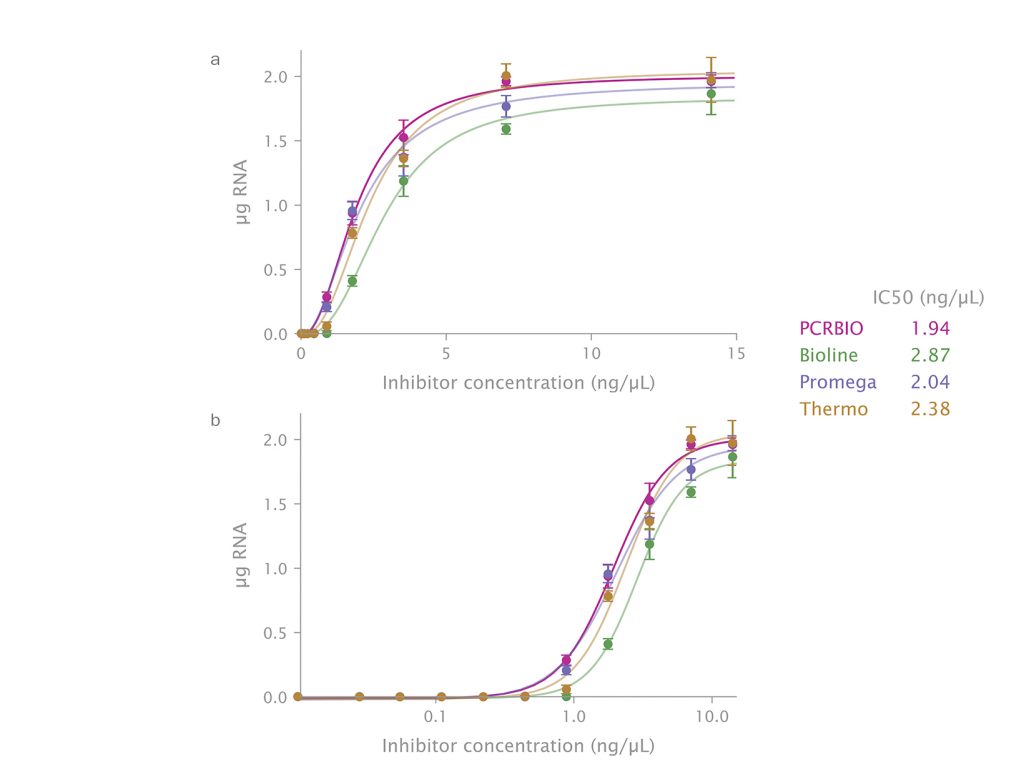
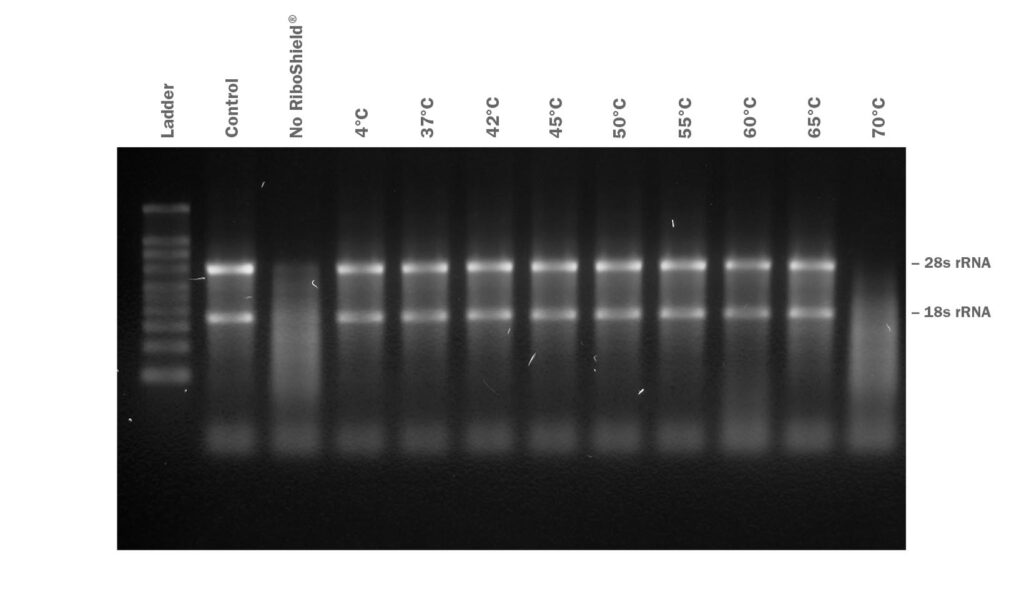
RNase inhibitor with superior RNA protection
RiboShield® RNase Inhibitor is designed for RNA-sensitive applications including RNA isolation, RT-qPCR, cDNA synthesis, and RNA sequencing, to shield your RNA from degradation and provide higher yields and better performance as a result.
The inhibitor binds noncovalently to RNases at a 1:1 ratio and with very rapid kinetics of association, guaranteeing immediate protection of your RNA. RiboShield® RNase Inhibitor has been tested in RT-qPCR and offers the greatest RNA protection when compared to leading competitor products (see figure 1).
Stability at higher temperatures
RiboShield® RNase Inhibitor is able to perform over a wide range of reaction conditions and can sustain inhibition of RNase A at temperatures up to 65°C for at least 30 minutes (see figure 2). In addition, RiboShield® does not contain cysteine residues that have been implicated in the oxidation sensitivity of the human placental version of the protein1. This results in an RNase inhibitor molecule that is not only thermostable, but also more resistant to oxidative stress.
Flexible RNase inhibition
The inhibitor can be used to block the activity of a wide range of ribonucleases, including eukaryotic RNases of the neutral type (RNases A, B and C). It does not inhibit RNases T1, T2, U1, U2, CL3, RNase I and H. The inhibitor does not hinder other enzymes such as reverse transcriptases, RNA polymerases or Taq DNA polymerase making it compatible with many enzymatic reactions involving RNA.
RiboShield® RNase Inhibitor has a molecular weight of 50 kDa and is purified from from High Five insect cells expressing a modified human placental gene. The inhibitor binds noncovalently to RNases at a 1:1 ratio, and has a Ki value of approximately 10–14 M when binding to RNase A1. Moreover, the very rapid kinetics of association to RNases guarantees immediate protection of your RNA.
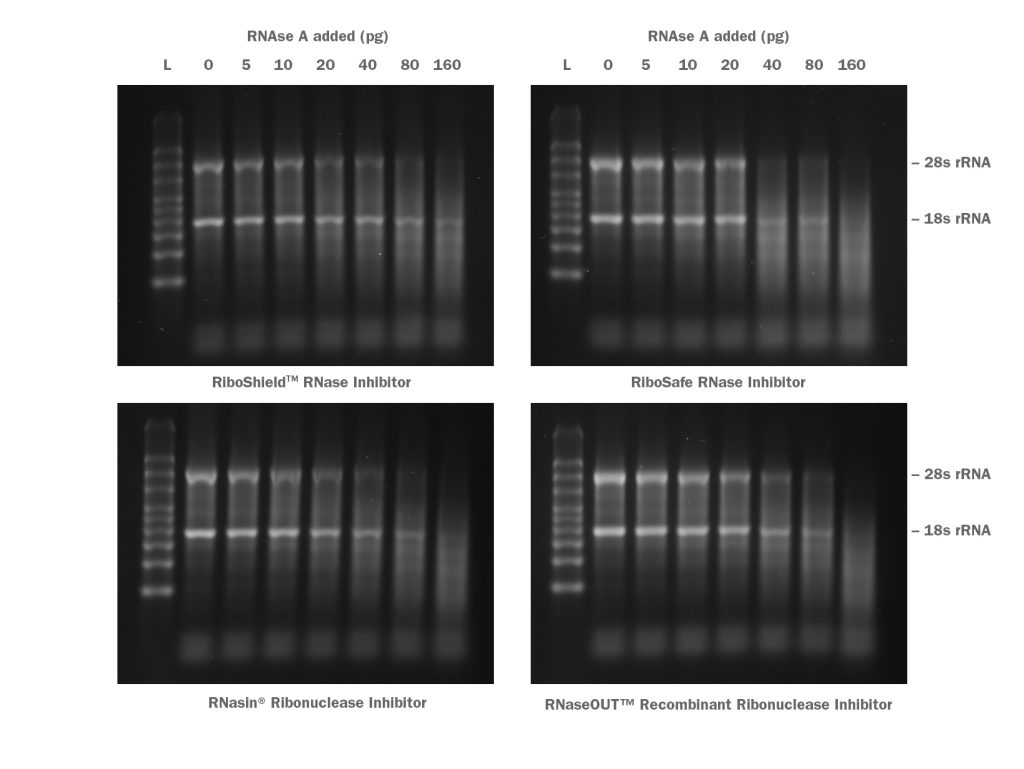
Documents
Product Flyers
Product Manuals
Material Safety Data Sheets
Certificate of Analysis Finder
Specifications
RiboShield® RNase Inhibitor
Component
2500 Units
10 000 Units
RiboShield RNase Inhibitor (40U/µL)
1 x 62.5µL
4 x 62.5µL
RiboShield® RNase Inhibitor
Component
RiboShield RNase Inhibitor (40U/µL)
2500 Units
1 x 62.5µL
10 000 Units
4 x 62.5µL
Reaction Volume
Storage
Not applicable
On arrival, products should be stored between -30 and -20 °C. If stored correctly the kit will retain full activity until the indicated expiry date.
Reaction Volume
Not applicable
Storage
On arrival, products should be stored between -30 and -20 °C. If stored correctly the kit will retain full activity until the indicated expiry date.
FAQs
How much RiboShield® should I add to my RNA samples for storage?
For sample storage we recommend using RiboShield® RNase inhibitor as a 100x solution (i.e., the concentration of RNase inhibitor in the storage buffer should be 0.4 U/μL). This final concentration can be exceeded without negatively affecting downstream enzymatic reactions, but is generally unnecessary, unless you suspect RNase contamination.
What does RiboShield® RNase inhibitor do?
RiboShield® RNase inhibitor acts as a shield against the degradation of target RNA which can be caused by ribonuclease contamination of the RNA preparation.
What can RiboShield® RNase inhibitor be used for?
RiboShield® RNase inhibitor is designed for use in RNA-sensitive applications such as RT-qPCR, cDNA synthesis and RNA-seq, where the presence of even small amounts of RNase can be detrimental to RNA quality and experimental outcome. In addition, it can also be added to extracted RNA to preserve RNA quality in areas with high likelihood of RNAse contamination or to RNA extraction buffers such as those used in Pereira et al., 2010, to help improve the preservation of RNA integrity as you progress through your workflow.
(Pereira MJB, Behera V, Walter NG (2010) Nondenaturing Purification of Co-Transcriptionally Folded RNA Avoids Common Folding Heterogeneity. PLOS ONE 5(9): e12953. https://doi.org/10.1371/journal.pone.0012953)
What kind of RNases can be inhibited using RiboShield® RNase inhibitor?
RiboShield® RNase inhibitor is a protein-based inhibitor that non-covalently binds and blocks the activity of the most common and troublesome RNases, including eukaryotic RNases of the neutral type (e.g. RNases A, B and C). It does not inhibit RNases T1, T2, U1, U2, CL3, RNase I and H.
How to use RiboShield® RNase inhibitor?
All PCRBIO products for 1-step and 2-step RT-PCR and RT-qPCR, as well as for cDNA synthesis, already contain the RNase inhibitor, so there is no need to add RiboShield® RNase inhibitor when using these products.
If used with other kits, we recommend adding 1µL (40U) of RiboShield® RNase inhibitor in a reaction mix of 20µL. In case the source of RNA is known to be rich in RNases, a titration may be required to verify full protection of the ribonucleic acid.
Ribonucleases (RNases) are found in all cell types and organisms, and their ubiquitous nature can be highly problematic in the lab. Contamination with even the smallest amount of RNase in an RNA sample is enough to completely destroy the RNA. RiboShield® RNase Inhibitor is a recombinant human placental protein that blocks the activity of a wide range of ribonucleases, including RNase A, B and C, to reliably protect your RNA from RNase digestion.
Features
- Superior protection leading to better performance of RNA-sensitive applications
- Particularly suited to incorporation into saliva-based tests for SARS-CoV-2 detection
- Compatible with reverse transcriptases, RNA polymerases and Taq DNA polymerase
- Protects RNA samples during storage
- Inhibits eukaryotic RNases, including RNase A, B and C
- Stable up to 65°C for at least 30 minutes
- Ribonuclease and phosphatase free
Applications
- cDNA synthesis
- 1-step RT-PCR
- 1-step RT-qPCR
- RNA purification
- RNA sequencing
- In vitro transcription and translation


RNase inhibitor with superior RNA protection
RiboShield® RNase Inhibitor is designed for RNA-sensitive applications including RNA isolation, RT-qPCR, cDNA synthesis, and RNA sequencing, to shield your RNA from degradation and provide higher yields and better performance as a result.
The inhibitor binds noncovalently to RNases at a 1:1 ratio and with very rapid kinetics of association, guaranteeing immediate protection of your RNA. RiboShield® RNase Inhibitor has been tested in RT-qPCR and offers the greatest RNA protection when compared to leading competitor products (see figure 1).
Stability at higher temperatures
RiboShield® RNase Inhibitor is able to perform over a wide range of reaction conditions and can sustain inhibition of RNase A at temperatures up to 65°C for at least 30 minutes (see figure 2). In addition, RiboShield® does not contain cysteine residues that have been implicated in the oxidation sensitivity of the human placental version of the protein1. This results in an RNase inhibitor molecule that is not only thermostable, but also more resistant to oxidative stress.
Flexible RNase inhibition
The inhibitor can be used to block the activity of a wide range of ribonucleases, including eukaryotic RNases of the neutral type (RNases A, B and C). It does not inhibit RNases T1, T2, U1, U2, CL3, RNase I and H. The inhibitor does not hinder other enzymes such as reverse transcriptases, RNA polymerases or Taq DNA polymerase making it compatible with many enzymatic reactions involving RNA.
RiboShield® RNase Inhibitor has a molecular weight of 50 kDa and is purified from from High Five insect cells expressing a modified human placental gene. The inhibitor binds noncovalently to RNases at a 1:1 ratio, and has a Ki value of approximately 10–14 M when binding to RNase A1. Moreover, the very rapid kinetics of association to RNases guarantees immediate protection of your RNA.

Request a Quote & Sample
Your Selection:
Documents
Product Flyers
Product Manuals
Material Safety Data Sheets
Certificate of Analysis Finder
Specifications
RiboShield® RNase Inhibitor
Component
2500 Units
10 000 Units
RiboShield RNase Inhibitor (40U/µL)
1 x 62.5µL
4 x 62.5µL
RiboShield® RNase Inhibitor
Component
RiboShield RNase Inhibitor (40U/µL)
2500 Units
1 x 62.5µL
10 000 Units
4 x 62.5µL
Reaction Volume
Storage
Not applicable
On arrival, products should be stored between -30 and -20 °C. If stored correctly the kit will retain full activity until the indicated expiry date.
Reaction Volume
Not applicable
Storage
On arrival, products should be stored between -30 and -20 °C. If stored correctly the kit will retain full activity until the indicated expiry date.
FAQs
How much RiboShield® should I add to my RNA samples for storage?
For sample storage we recommend using RiboShield® RNase inhibitor as a 100x solution (i.e., the concentration of RNase inhibitor in the storage buffer should be 0.4 U/μL). This final concentration can be exceeded without negatively affecting downstream enzymatic reactions, but is generally unnecessary, unless you suspect RNase contamination.
What does RiboShield® RNase inhibitor do?
RiboShield® RNase inhibitor acts as a shield against the degradation of target RNA which can be caused by ribonuclease contamination of the RNA preparation.
What can RiboShield® RNase inhibitor be used for?
RiboShield® RNase inhibitor is designed for use in RNA-sensitive applications such as RT-qPCR, cDNA synthesis and RNA-seq, where the presence of even small amounts of RNase can be detrimental to RNA quality and experimental outcome. In addition, it can also be added to extracted RNA to preserve RNA quality in areas with high likelihood of RNAse contamination or to RNA extraction buffers such as those used in Pereira et al., 2010, to help improve the preservation of RNA integrity as you progress through your workflow.
(Pereira MJB, Behera V, Walter NG (2010) Nondenaturing Purification of Co-Transcriptionally Folded RNA Avoids Common Folding Heterogeneity. PLOS ONE 5(9): e12953. https://doi.org/10.1371/journal.pone.0012953)
What kind of RNases can be inhibited using RiboShield® RNase inhibitor?
RiboShield® RNase inhibitor is a protein-based inhibitor that non-covalently binds and blocks the activity of the most common and troublesome RNases, including eukaryotic RNases of the neutral type (e.g. RNases A, B and C). It does not inhibit RNases T1, T2, U1, U2, CL3, RNase I and H.
How to use RiboShield® RNase inhibitor?
All PCRBIO products for 1-step and 2-step RT-PCR and RT-qPCR, as well as for cDNA synthesis, already contain the RNase inhibitor, so there is no need to add RiboShield® RNase inhibitor when using these products.
If used with other kits, we recommend adding 1µL (40U) of RiboShield® RNase inhibitor in a reaction mix of 20µL. In case the source of RNA is known to be rich in RNases, a titration may be required to verify full protection of the ribonucleic acid.





